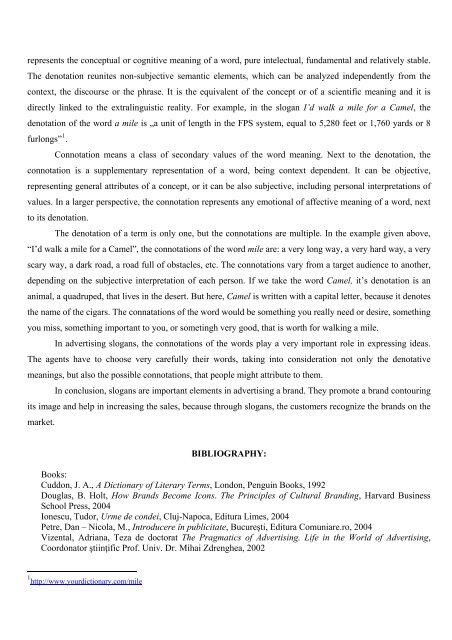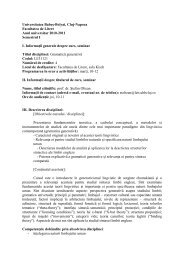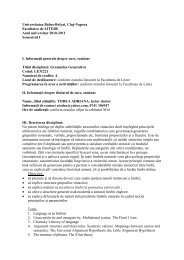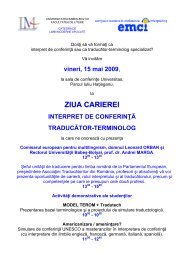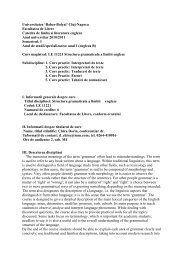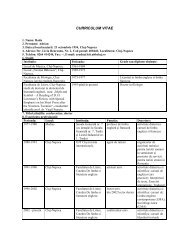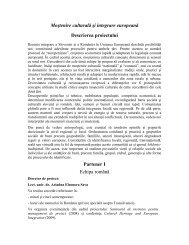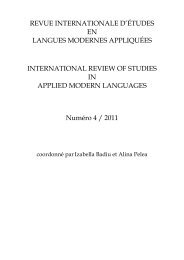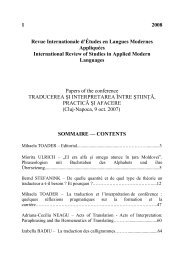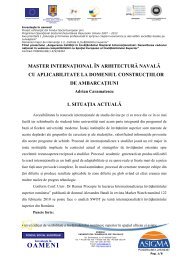Dimensiuni ale limbajului n context carceral
Dimensiuni ale limbajului n context carceral
Dimensiuni ale limbajului n context carceral
You also want an ePaper? Increase the reach of your titles
YUMPU automatically turns print PDFs into web optimized ePapers that Google loves.
epresents the conceptual or cognitive meaning of a word, pure intelectual, fundamental and relatively stable.<br />
The denotation reunites non-subjective semantic elements, which can be analyzed independently from the<br />
<strong>context</strong>, the discourse or the phrase. It is the equiv<strong>ale</strong>nt of the concept or of a scientific meaning and it is<br />
directly linked to the extralinguistic reality. For example, in the slogan I’d walk a mile for a Camel, the<br />
denotation of the word a mile is „a unit of length in the FPS system, equal to 5,280 feet or 1,760 yards or 8<br />
furlongs” 1 .<br />
Connotation means a class of secondary values of the word meaning. Next to the denotation, the<br />
connotation is a supplementary representation of a word, being <strong>context</strong> dependent. It can be objective,<br />
representing general attributes of a concept, or it can be also subjective, including personal interpretations of<br />
values. In a larger perspective, the connotation represents any emotional of affective meaning of a word, next<br />
to its denotation.<br />
The denotation of a term is only one, but the connotations are multiple. In the example given above,<br />
“I’d walk a mile for a Camel”, the connotations of the word mile are: a very long way, a very hard way, a very<br />
scary way, a dark road, a road full of obstacles, etc. The connotations vary from a target audience to another,<br />
depending on the subjective interpretation of each person. If we take the word Camel, it’s denotation is an<br />
animal, a quadruped, that lives in the desert. But here, Camel is written with a capital letter, because it denotes<br />
the name of the cigars. The connatations of the word would be something you really need or desire, something<br />
you miss, something important to you, or sometingh very good, that is worth for walking a mile.<br />
In advertising slogans, the connotations of the words play a very important role in expressing ideas.<br />
The agents have to choose very carefully their words, taking into consideration not only the denotative<br />
meanings, but also the possible connotations, that people might attribute to them.<br />
In conclusion, slogans are important elements in advertising a brand. They promote a brand contouring<br />
its image and help in increasing the s<strong>ale</strong>s, because through slogans, the customers recognize the brands on the<br />
market.<br />
BIBLIOGRAPHY:<br />
Books:<br />
Cuddon, J. A., A Dictionary of Literary Terms, London, Penguin Books, 1992<br />
Douglas, B. Holt, How Brands Become Icons. The Principles of Cultural Branding, Harvard Business<br />
School Press, 2004<br />
Ionescu, Tudor, Urme de condei, Cluj-Napoca, Editura Limes, 2004<br />
Petre, Dan – Nicola, M., Introducere în publicitate, Bucureşti, Editura Comuniare.ro, 2004<br />
Vizental, Adriana, Teza de doctorat The Pragmatics of Advertising. Life in the World of Advertising,<br />
Coordonator ştiinţific Prof. Univ. Dr. Mihai Zdrenghea, 2002<br />
1 http://www.yourdictionary.com/mile


